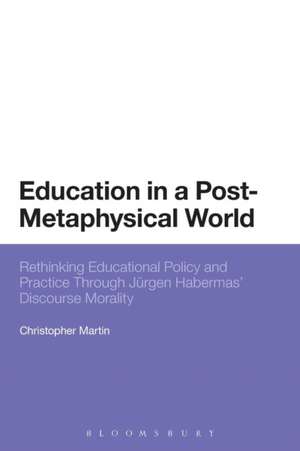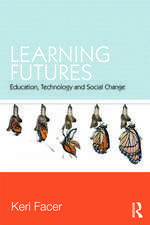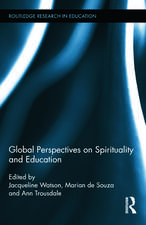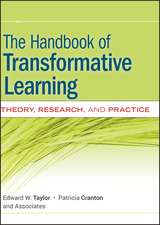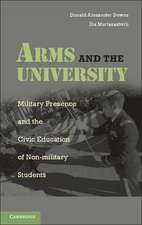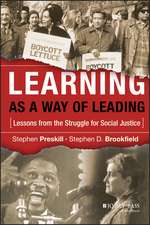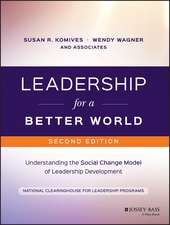Education in a Post-Metaphysical World: Rethinking Educational Policy and Practice Through Jürgen Habermas’ Discourse Morality
Autor Christopher Martinen Limba Engleză Paperback – 9 apr 2014
| Toate formatele și edițiile | Preț | Express |
|---|---|---|
| Paperback (1) | 256.20 lei 6-8 săpt. | |
| Bloomsbury Publishing – 9 apr 2014 | 256.20 lei 6-8 săpt. | |
| Hardback (1) | 889.23 lei 6-8 săpt. | |
| Bloomsbury Publishing – 24 oct 2012 | 889.23 lei 6-8 săpt. |
Preț: 256.20 lei
Preț vechi: 330.52 lei
-22% Nou
Puncte Express: 384
Preț estimativ în valută:
49.02€ • 53.42$ • 41.31£
49.02€ • 53.42$ • 41.31£
Carte tipărită la comandă
Livrare economică 23 aprilie-07 mai
Preluare comenzi: 021 569.72.76
Specificații
ISBN-13: 9781472569127
ISBN-10: 1472569121
Pagini: 192
Ilustrații: black & white illustrations
Dimensiuni: 156 x 234 x 11 mm
Greutate: 0.3 kg
Ediția:NIPPOD.
Editura: Bloomsbury Publishing
Colecția Bloomsbury Academic
Locul publicării:London, United Kingdom
ISBN-10: 1472569121
Pagini: 192
Ilustrații: black & white illustrations
Dimensiuni: 156 x 234 x 11 mm
Greutate: 0.3 kg
Ediția:NIPPOD.
Editura: Bloomsbury Publishing
Colecția Bloomsbury Academic
Locul publicării:London, United Kingdom
Caracteristici
An
accessible
exploration
of
Habermas'
Discourse
Morality,
an
increasingly
influential
but
notoriously
abstract
theory.
Notă biografică
Christopher
Martinis
Assistant
Professor
of
Education
at
the
University
of
British
Columbia,
Kelowna,
Canada.
Cuprins
IntroductionPart
I:
Education
and
the
Sources
of
Normativity1.
What
Kind
of
Concept
is
the
Concept
of
Education?2.
Education,
Worthwhileness
and
the
Good3.
R.S.
Peters'
Theory
of
Justification4.
Jurgen
Habermas'
Discourse
MoralityInterlude:
Kantian
Constructivism
and
EducationPart
II:
Discourse
Morality
and
Education5.
Applying
Habermas'
Discourse
Principle
to
Education6.
Norms,
Reasons
and
and
Complex
Proceduralism
in
Discourse
MoralityConclusion:
Complex
Proceduralism
and
Public
UnderstandingReferencesIndex
Recenzii
This
book
provides
further
evidence
that
Christopher
Martin
is
today
one
of
the
most
interesting
and
promising
young
philosophers
in
the
field
of
educational
philosophy.
His
reading
and
application
of
Habermas'
Discourse
Theory
of
Morality
is
a
bold
and
important
contribution
to
contemporary
scholarship
in
educational
policy
and
will
no
doubt
prove
to
be
fruitfully
contentious
over
the
coming
years.
InEducation in a Post-Metaphysical World, Christopher Martin shows in a highly elaborated way how the articulation and the justification of norms and criteria of education can be carried out by the practice of public moral reasoning. In doing so he makes a great contribution to the conceptual analysis of education (and so to the philosophy of education in general). In addition, his book should also be seen as an important educationalist enrichment of the model of Discourse Ethics itself.
With an eye on educational policy and teacher practice Christopher Martin scrutinizes the concept of education very clearly in its normative connotation. He legitimizes his conviction that the educational domain is a moral theme in its own right as opposed to a merelyad hoc, empirical or philosophically applied consideration. Theoretically speaking, his critical reconstruction of Habermas' Discourse Morality contributes to that conviction in a very creative way.
Martin deftly brings together disparate developments in ethics, political theory, and education and does so in a straightforward and concise fashion. In particular, he shows us that conceptual analysis, long thought to be moribund in philosophy of education, remains a vital force in analysing certain contemporary political issues, such as the (political) question of Aboriginal education. A strongly recommended read.
InEducation in a Post-Metaphysical World, Christopher Martin shows in a highly elaborated way how the articulation and the justification of norms and criteria of education can be carried out by the practice of public moral reasoning. In doing so he makes a great contribution to the conceptual analysis of education (and so to the philosophy of education in general). In addition, his book should also be seen as an important educationalist enrichment of the model of Discourse Ethics itself.
With an eye on educational policy and teacher practice Christopher Martin scrutinizes the concept of education very clearly in its normative connotation. He legitimizes his conviction that the educational domain is a moral theme in its own right as opposed to a merelyad hoc, empirical or philosophically applied consideration. Theoretically speaking, his critical reconstruction of Habermas' Discourse Morality contributes to that conviction in a very creative way.
Martin deftly brings together disparate developments in ethics, political theory, and education and does so in a straightforward and concise fashion. In particular, he shows us that conceptual analysis, long thought to be moribund in philosophy of education, remains a vital force in analysing certain contemporary political issues, such as the (political) question of Aboriginal education. A strongly recommended read.
